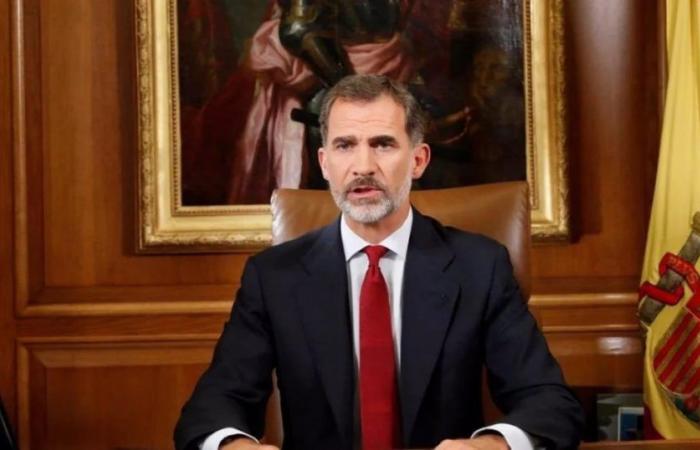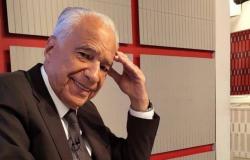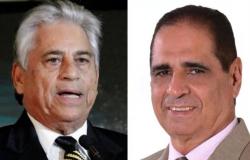On June 19, 2014, Prince Felipe VI was proclaimed King of Spain. This event occurred after his father, Juan Carlos I, announced his abdication on June 2 of the same year, thus marking a significant change in the country’s monarchy. His decade on the throne has been marked by various challenges that have tested both the sovereign and the institution of the Crown. Since his promotion he has had to deal with a variety of complex issues in the institutional, social and family spheres. We review these 10 years, highlighting 10 key moments that have marked his reign.
On June 2, 2014, Don Juan Carlos announced his abdication in favor of his son Don Felipe. Through an institutional message to the nation, the King explained the reasons that had led him to make the decision. He spoke about the crisis that was hitting Spain at that time, which motivated “an impulse for renewal.” Guided by the conviction to provide a better service, he announced that he was ending his reign and abdicating the Crown of Spain. On June 18, Juan Carlos I formalized his resignation passing the baton to her son, thus making Letizia Ortiz queen and Leonor de Borbón the princess of Asturias,
On June 19, the swearing-in and proclamation of Felipe VI as the new King of Spain was celebrated in a brief and solemn ceremony. That Thursday the then crown prince swore before the General cuts fulfill the duties established by the Spanish constitution. The act, which marked the beginning of his reign, was followed by the oath of loyalty to the Magna Carta and the institutions of the State. In his speech, Felipe VI stressed his commitment to the unity of Spain and the democracy.
In January 2016, Felipe VI starred in his first round of consultations with the parties to try to form a government, a mechanism that has had to be used even in ten occasions. This figure equals the number of consultations made by his father, Juan Carlos I, in almost four decades of reign.
During his time, there have been celebrations five general elections (with his father there were ten). Furthermore, two unprecedented situations have arisen in the Spanish political context: the candidate with the greatest support declined the investiture, as happened with Mariano Rajoy after the first round of consultations, and for the first time a motion of censure was successful that led to Pedro Sanchez to power in June 2018.
The jihadist attacks of August 17, 2017 in Barcelona and Cambrils (Tarragona), which left 15 dead, caused a great commotion in the country. These incidents led Don Felipe to attend the demonstration of rejection called nine days later. This was the first time that a Spanish monarch joined a popular protestmarking a historical milestone.
On October 1, 2017, it took place in Catalonia a referendum whose character was determined as illegal by the government of Spain. Two days later, the monarch addressed the nation in a message that was described as exceptional within his reign, since he had never before given a speech of such magnitude and relevance since his accession to the throne in 2014. During the his intervention, Philip VI pointed out the “extreme seriousness” of the situation generated by the actions of the independence leaders and the “unacceptable disloyalty” of the government of the Generalitat.
He accused Carles Puigdemont and the members of his Government of having “broken the democratic principles of any rule of law and of having” undermined harmony and coexistence in Catalan society itself. He took the opportunity to send a message to all political leaders: “It is the responsibility of the legitimate powers of the State to ensure constitutional order and the normal functioning of institutions.”
In it Congress of Deputies On December 6, 2018, one of the most significant events of the year took place: the commemoration of the 40th anniversary of the Spanish constitution. The ceremony brought together two kings in Parliament for the first time since 1902, Juan Carlos I and Philip VIaccompanied by the heir to the throne, Leonor.
During the event, Felipe VI recognized the legacy of Juan Carlos I, supporting his influence in the democratic transition. However, months after this tribute, Felipe VI renounced his father’s inheritance and withdrew the State allocation. Furthermore, he facilitated his departure from Spain, pointing to irregular behavior by the former monarch.
On November 12, 2019, King Felipe VI held a historical visit to Cuba, It was the first time in 500 years that a Spanish monarch had set foot on the island, although his father was in Havana at the Ibero-American summit held 20 years earlier.
Another of the unprecedented situations that the King has had to face has been the crisis due to the coronavirus pandemic. The monarch addressed the nation again four days after the state of alarm and confinement of the population was decreed. He thanked the health professionals for their great work and did not fail to recognize their efforts: “You have our greatest admiration and respect, our total support. “You are the vanguard of Spain in the fight against this disease, you are our first line of defense.”
On August 3, 2020, Juan Carlos I it came out of Spain bound for Abu Dhabi due to his personal conduct and fiscal irregularities. This item was the result of an agreement between the Government and Felipe VI with the objective of preserving the integrity of the Crown.
In a similar action and in his first year of reign, Felipe VI decided to revoke the title of Duchess of Palm to his sister, the infanta Christinadue to his involvement in the case Nooswhich ended up condemning Iñaki Urdangarin.
He King Felipe VI and the Queen Letizia have shown their support for families affected by various natural disasters that have occurred in the last decade in Spain. One of the most recent events was the eruption of La Palma volcano on September 19, 2021. The royal couple traveled to the island to offer their solidarity to those affected by the devastation caused by the volcanic eruption.
The Princess Eleanor He celebrated his coming of age on October 31, 2023 with a ceremony in the Congress of Deputies of Spainwhere he swore the Constitution. This act, which marks the continuity of the Spanish parliamentary monarchy, allows Leonor to assume the functions of queen if her father, the king Philip VIwould be disabled.






